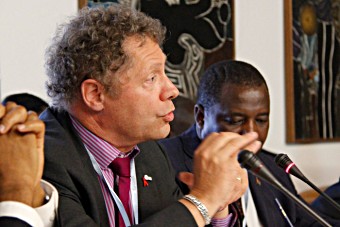
Dr Seth Berkley, speaking during the 65th World Health Assembley in Geneva, Switzerland. Source: GAVI/2012.
Geneva, 23 May 2012 – GAVI will focus more on boosting coverage rates for routine immunisation, while increasingly tailoring its approach to individual countries, CEO Dr Seth Berkley said on Wednesday.
One year after donors pledged an extra US$ 4.3 billion for immunisation, developing countries are introducing new vaccines at an astonishing rate but routine immunisation still misses 19.3 million children every year, Dr Berkley told health officials from GAVI-eligible countries in a presentation.
“GAVI is going to focus more and more energy with the partners on how we deal with countries that have low coverage rates,” he said, noting that every year 8.8 million children in India and Nigeria miss routine immunisation but both countries are working to increase their immunisation coverage.
“We’re excited by that,” he said.
Supply issues
Dr Berkley showed a film (see right) of Ghana’s double vaccine launch to the officials, who are in Geneva for the 65th World Health Assembly, and presented an update on GAVI progress and policies. By the end of 2013, the pentavalent vaccine will have reached every GAVI eligible country, while demand for the pneumococcal and rotavirus vaccines has been extraordinarily high, he said.
“This has meant that - despite the fact that industry as our partners have worked incredibly hard with us to try to meet the demand - we will have some supply issues with vaccines,” he said.
“Over the long-term we see adequate supply,” he added.
Inexpensive vaccine
GAVI is going to focus more and more energy with the partners on how we deal with countries that have low coverage rates. Dr.Seth Berkley, GAVI CEO |
Dr Berkley highlighted GAVI’s support for the yellow fever, measles second dose, and meningitis A vaccines. Produced in just one decade, the single-dose meningitis A vaccine costs just US$ 0.52 per dose. “This is really an extraordinary story – the ability to make an inexpensive vaccine,” Dr Berkley said.
Introduced to the first countries in December 2010 with GAVI support, the single-dose meningitis A vaccine has dramatically reduced the burden of disease in several countries, he added.
HPV and measles-rubella vaccines
In 2012, GAVI began to offer support to developing countries for the human papillomavirus (HPV) and combined measles-rubella vaccines, following agreement by the Board in November last year. One of the conditions for GAVI to support HPV immunisation is an acceptable price commitment from manufacturers, Dr Berkley said.
Dr Berkley said the measles-rubella vaccine could reach 31 countries by 2015 and 49 countries by 2018.
“This is a very, very ambitious programme,” he said, adding that GAVI was considering additional support for measles immunisation. “We know there are outbreaks going on and that is an incredibly important priority,” he said.
Tailored report
GAVI will launch a new performance-based approach later this year and had once considered tailoring its approach to fragile states, Dr Berkley said.
But, out of 73 countries eligible for GAVI support, 44 can be described as “fragile” and recent research showed immunisation performance is not linked to a state’s fragility.
Dr Berkley said he would be building the number of staff to increase interactions with countries.
“My own personal priority is doing a better job in supporting countries,” he said.
Afisah Zakariah from Ghana’s health ministry thanked GAVI for its support of the rotavirus and pneumococcal vaccines, praised the video, and said Ghana would do more with immunisation. “We will come and apply for measles and rubella,” she said.
